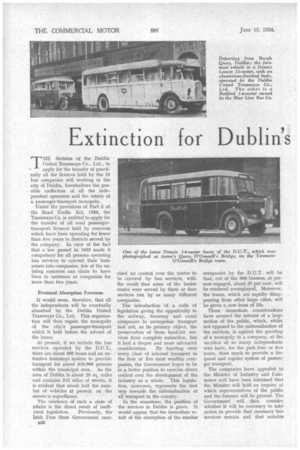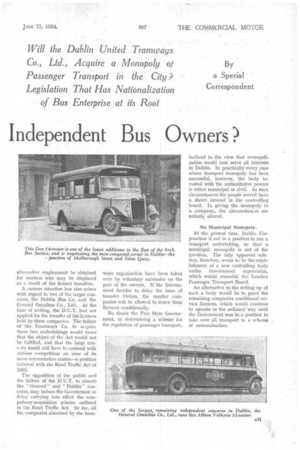Extinction for Dublin's Independent Bus Owners?
Page 44

Page 45

If you've noticed an error in this article please click here to report it so we can fix it.
By a Special Correspondent
THE decision of the Dublin United Tramways Co., Ltd., to apply for the transfer of practically all the licences held by the 19 bus companies still working in the city of Dublin, foreshadows the possible extinction of all the independent operators and the return of a passenger-transport monopoly.
Undet the provisions of Part 5 of the Road Traffic Act, 1933, the Tramways Co. is entitled to apply for the transfer of all road passengertransport licences held by concerns which have been operating for fewer than five years in districts served by the company. In view of the fact that a law passed in 1932 made it compulsory for all persons operating bus services to convert their businesses into companies, few of the existing concerns can claim to have been in existence as companies for more than two years.
Eventual Absorption Foreseen.
It would seem, therefore, that all the independents will be eventually absorbed by the Dublin United Tramways Co., Ltd. This organization will then regain the monopoly of the city's passenger-transport which it held before the advent of the buses.
At present, if we include the bus services operated by the D.U.T., there are about 300 buses and an extensive tramways system to provide transport for about 419,000 persons within the municipal area. As the area of Dublin is about 29 sq.. miles and contains 313 miles of streets, it is evident that about half the number of vehicles at present on the streets is superfluous.
The existence of such a state of affairs is the direct result of ine.fficient legislation._ Previously, the Irish Free State Government exer u30 cised no control over the routes to be covered by bus services, with the result that some of the busier routes were served by three or four services run by as many different companies.
The introduction of a code of legislation giving the opportunity to the railway, tramway and canal companies to monopolize transport had not, as its primary object, the preservation of these hard-hit services from complete extinction, but it had a deeper and more advanced consideration. By handing over every class of internal transport to the four or five most wealthy companies, the Government hopes to be in a better position to exercise direct control over the development of the industry as a whole. This legislation, moreover, represents the first step towards the nationalization of all transport in the country.
In the meantime, the position of the services in Dublin is grave. It would appear that the immediate result of the absorption of the smaller companies by the D.U.T. will be that, out of the 668 busmen at present engaged, about 37 per cent. will be rendered unemployed. Moreover, the trains, which are rapidly disappearing from other large cities, will be given a new lease of life.
These immediate considerations have aroused the interest of a large section of the public, which, whilst not opposed to the nationalization of the services, is against the granting of a monopoly to a company, at the sacrifice of so many independents who have, for the past four or five years, done much to provide a frequent and regular system of passenger transport.
The companies have appealed to the Minister of Industry and Commerce and have been informed that the Minister will hold an inquiry at which representatives of the public and the busmen will be present. The Government will then consider whether it will be necessary to take action to provide that necessary bus services remain and that suitable alternative employment be obtained for workers who may be displaced as a result of the licence transfers.
A curious situation has also arisen with regard to two of the larger concerns, the Dublin Bus Co. and the General Omnibus Co., Ltd. At the time of writing, the D.U.T. had not applied for the transfer of the licences held by these companies. The failure of the Tramways Co. to acquire these two undertakings would mean that the object of the Act would not be fulfilled, and that the large conc(srn would still have to contend with serious competition on nine of its most remunerative routes—a position inimical with the Road Traffic Act of 1933.
The opposition of the public and the failure of the D.U.T. to absorb the " General" and " Dublin" concerns, may induce the Government to delay carrying into effect the compulsory-acquisition scheme outlined in the Road Traffic Act. So far, all the companies absorbed by the tram. ways organization have been taken over by voluntary surrender on the part of the owners. If the Government decides to delay the issue of transfer Orders, the smaller companies will be allowed to renew their licences conditionally.
No doubt the Free State Government, in determining a scheme for the regulation of passenger transport, inclined to the view that monopolization would best serve all interests in Dublin. In practically every case where transport monopoly has been successful, however, the body invested with the authoritative powers is either municipal or civil. In such circumstances the people served have a direct interest in the controlling board. In giving the monopoly to a company, the circumstances are entirely altered.
No Municipal Monopoly.
At the present time, Dublin Corporation is not in a position to run a transport undertaking, so that a municipal monopoly is out of the question. The only apparent solu tion, therefore, seems to be the establishment of a new controlling body under Government supervision, which would resemble the London Passenger Transport Board.
An alternative to the setting up of such a body would be to grant the remaining companies conditional service licences, which would continue to operate in the ordinary way until the Government was in a position to take over all transport in a scheme of nationalization.




























































































